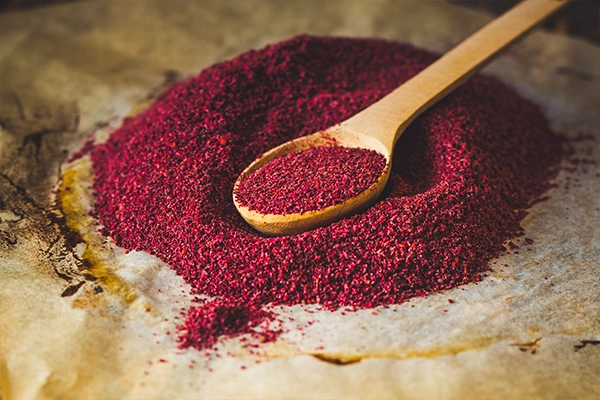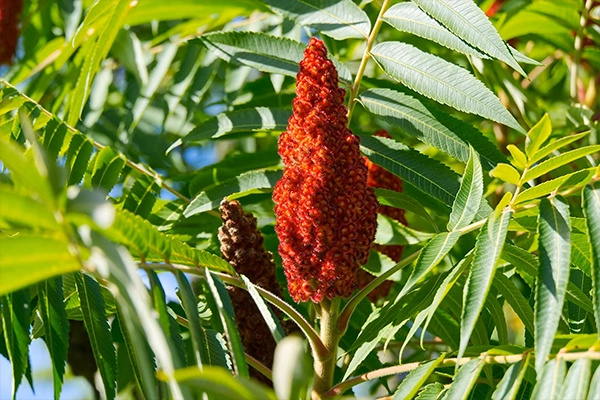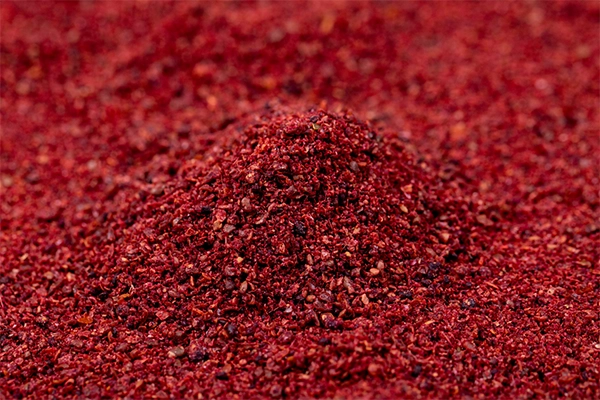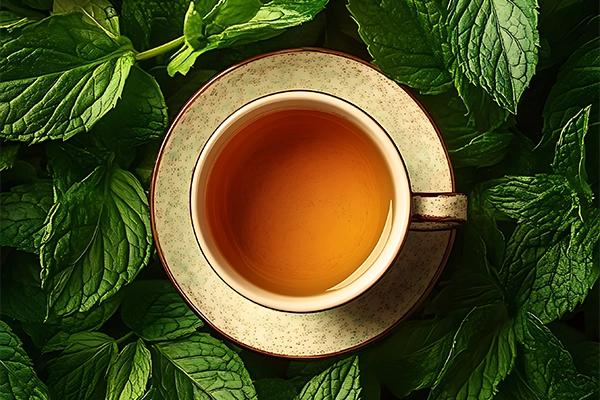Sumac is one of the most widely used and characteristic seasonings in Iranian and Middle Eastern cooking. This sour-tasting spice, which is made from the dried fruit of the sumac tree, not only makes the taste of food more appetizing, but also has numerous therapeutic properties. In this article, we will discuss the scientific truth about the sumac benefits for digestive health and boosting the immune system.

What is sumac?
Sumac (scientific name Rhus coriaria) is a type of mountain plant that grows in Mediterranean regions. The small, red fruits of this plant are dried and ground into powder and used as a spice. This powder is rich in antioxidant compounds, polyphenols, and vitamin C.
sumac benefits for digestion
One of the most important sumac benefits is its positive effects on the digestive system. The compounds in sumac can help improve the functioning of the stomach and intestines:
- Reducing bloating and gas: Sumac has astringent properties and can help reduce bloating, heartburn, and gas.
- Improving digestion: This spice stimulates the secretion of digestive enzymes that facilitate the digestion process.
- Natural anti-diarrhea: Sumac is also effective in treating mild diarrhea due to its antibacterial and astringent properties.
sumac benefits for the immune system
Another benefit of sumac is strengthening the immune system. Antioxidants and vitamin C in sumac play an important role in this regard:
- Fighting free radicals: The antioxidant compounds in sumac reduce chronic inflammation and prevent cell damage.
- Increasing the body’s resistance to infections: Vitamin C and tannins in sumac improve the function of immune cells.
- Antimicrobial and antiviral properties: Sumac can inhibit the growth of some bacteria and viruses and act as a natural protector.
How to benefit from the sumac benefits?
To benefit from the benefits of sumac, it can be added to foods such as barbecue, salads, yogurt, and even traditional drinks. Also, consuming sumac tea or its infusion is one of the traditional methods for the therapeutic use of this plant.
Sumac is not only a fragrant and flavorful spice, but also a natural source of beneficial compounds for the body. Sumac benefits for digestion, such as aiding digestion and reducing bloating, as well as its effect on boosting the body’s immunity, have been the focus of traditional medicine and scientific research. Including this spice in your daily diet can be an effective step towards improving your overall health.
How to Add Sumac to Your Diet?
Adding Sumac to your diet is not only easy, but it is also a delicious and effective way to enjoy the Sumac Benefits in your daily health. This spice, with its sour and hearty taste, can be used in a variety of foods and drinks, while also helping to improve digestion and strengthen the immune system.
Practical ways to use Sumac:
Add to meat dishes: Sumac is one of the most popular seasonings for barbecue, chicken and fish. Sprinkling a little sumac on cooked meat can both improve its taste and benefit from the Sumac Benefits for digestion.
With salad or vegetables: Sprinkle some sumac on Shirazi salad, greens or green salads to create a different taste and benefit from its anti-inflammatory and digestive properties.
In Yogurt or Buttermilk: Combining sumac with yogurt or buttermilk creates a beneficial and cooling drink that is very beneficial for the stomach. This combination can be one of the simple ways to absorb the benefits of sumac.
Sumac Tea or Tea: Sumac tea is one of the traditional ways to use sumac medicinally. To prepare it, brew a spoonful of sumac in boiling water and drink it. This tea is especially effective for relieving digestive problems and boosting the body’s immunity.
Sumac Powder in Traditional Foods: A little sumac can also be added to many Iranian dishes, such as lentil soup or eggplant curd, to both make them taste more enjoyable and to benefit from the sumac benefits.
Warnings You Should Know Before Consuming Sumac
Although the benefits of sumac for digestion and strengthening the immune system are very impressive, consuming it without knowledge may cause complications for some people. Knowing these precautions will help you enjoy this useful spice with peace of mind.
1. Possible allergies
Some people may be allergic to sumac. Symptoms of this allergy can include itching, burning throat, or skin rash. If you experience these symptoms, stop taking sumac and consult a doctor.
2. Overconsumption
Although the benefits of sumac are many, overconsumption can lead to stomach irritation, dry mouth, or even low blood pressure. Moderate consumption (for example, one to two teaspoons daily) is sufficient to benefit from its properties.
3. Drug interactions
People taking blood thinners or blood pressure-lowering medications should consult their doctor before taking sumac continuously, as some of the ingredients in sumac may interact with these medications.
4. Caution during pregnancy and lactation
There is not enough scientific information about excessive consumption of sumac during pregnancy or lactation. Although the benefits of sumac for the body are clear, it is better to use it only after consulting a doctor during these sensitive periods.
5. Choosing pure and hygienic sumac
Always buy sumac from reputable stores. The bulk or impure type may contain additives or unhealthy ingredients that not only reduce the benefits of sumac, but may also be harmful to your health.
Definitely! Below is a complete and comprehensive conclusion of the entire article titled “The Truth About the Benefits of Sumac for Digestion and Immunity”. In this section, the main and secondary keywords (benefits of sumac) have been used naturally and effectively:

Conclusion
Finally, it can be said that sumac is not only a tasty and widely used spice in cooking, but also a natural ingredient rich in therapeutic properties. The benefits of sumac for the health of the body, especially in two important areas, namely digestion and immunity, have been well confirmed by traditional medicine sources and some scientific research. With its antioxidant, anti-inflammatory and antibacterial properties, this spice can help improve the functioning of the stomach and intestines, reduce bloating and strengthen the immune system.
In addition, there are various ways to add sumac to the diet, which can effortlessly benefit from the benefits of sumac in everyday life. However, like any other natural ingredient, it is essential to be aware of the warnings about consumption and observe moderation in its use.
So if you are looking for a natural and effective way to improve digestive health and increase your body’s resistance, sumac can be a simple but powerful option for you.










